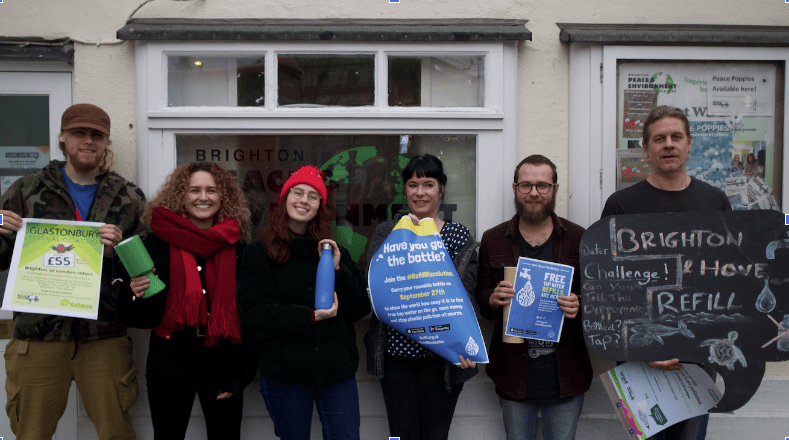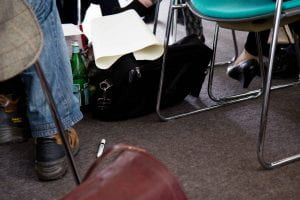I finished Media and Environmental Communication this year, and since then I have been volunteering for local environmental charities, something I am looking to pursue long term and possibly turn into a career path. This is common for MEC students, as most of us tend to volunteer at some point while studying towards the BA. Working together and helping out is in our nature (pun intended)! So, I bet a lot of you reading this are looking towards charity work as well! I’m here to let you know – you’re on the right track.
This summer I am working for The Green Centre and Refill, a large and ongoing campaign that was founded by City to Sea. You might have heard of some of these before… The Green Centre is an educational powerhouse, and they focus on providing information on everything green. They also have a stall at Brighton Open Market, where you can recycle some of your more bizarre household waste – from asthma pumps to dental floss. Refill is a campaign that is combating plastic waste on a national scale, totalling nearly 200 schemes across the UK. Their main goal is to stop the UK buying water in plastic bottles and start a ‘Refill Revolution’, making tap water more accessible by adding willing businesses to their app as Refill Stations. So far, over 20,000 locations have joined, including the likes of Starbucks and Whole Foods. They even have a collaboration with the popular bottle brand Chilly’s. City to Sea, the founders of Refill, are a prominent charity with an international scope that fights against ocean plastics. My role in these charities is primarily research based – I research and create documents and blogs on a huge array of different subjects for educational and promotional purposes… that’s where MEC comes in!
There are two main themes that glue this course together – social and environmental justice, and media production. Both are absolute necessities in a charity setting. For me, the media production side involved learning video production, website building, presentation skills and writing. This has allowed me to approach charities with a huge range of valuable abilities, which can be extremely beneficial for the dynamic working environments you encounter in the charity sector. I was given plenty of opportunity to fine-tune and develop these skills throughout my three years. From guest talks by art-activists such as our visit to ONCA in my second year, to the way some of my peers visited the St. Michael and All Angels church to produce audio-visual material to help raising funds for the urgent need to restoration of the church murals, painted by the Bloomsbury group. You can have a look at what they did here: Audiovisual Professional Practice Fieldtrip – Berwick
The opportunity that really stood out for me though, was the Media Placement module, where I was tasked with finding a month-long work placement in any area of the media. Naturally, I chose a charity. After much searching I landed a job with the Brighton Peace and Environment Centre, where I spent a month campaigning, creating videos, documents, websites and more! It was an amazing opportunity that threw me out of my comfort zone and into the so called ‘real world’, where I got immensely valuable experience and insight into how a charity is run. I had another, similar experience with the module Social Action and Community Media, where we were tasked with creating a fundraising campaign for a community radio station in Kenya! These experiences were massively valuable and helped remove some of the dread I felt about joining a professional work environment.
Obviously, all this media production and hands on experience wouldn’t be of much help if I wasn’t also given the run-down on some of the world’s biggest and most pressing social and environmental problems – it’d be pretty difficult to campaign for something I didn’t really understand! Modules like Global Environmental Issues, Social and Cultural Geography and Political Ecology gave me the opportunity to delve deep into issues like air pollution, environmental protest, surveillance issues, gentrification, alternative food/farming, constructions of nature and more. Learning about such a broad range of subjects has given me the confidence to take on whatever subject I’m given by the charities I work for – specialising in one area is great, but in charity work it’s much better to be familiar with as many topics as possible. It also helps fine-tune your capacity to do research effectively, meaning you can expand your knowledge quickly and efficiently at a moments notice. Pretty handy, considering the range of campaigns you’re likely to work on!
I could go on all day about the practical benefits of this course regarding charity work, but there’s one thing that, for me, trumps all else in importance – passion. If you are a MEC student, or considering becoming one, chances are you have an unbridled passion for protecting, conserving, and giving a voice to the environment. Learning even more about the suffering of this planet is often no easy task, but it helps fuel the fire. This course has relentlessly excelled and streamlined my passion for environmental protection, allowing me to direct the things that drive me not into angry social media posts or heated discussions, but into practical and direct action in environmental communication that truly makes a difference – and isn’t that our ultimate goal?
By Henry Farman



